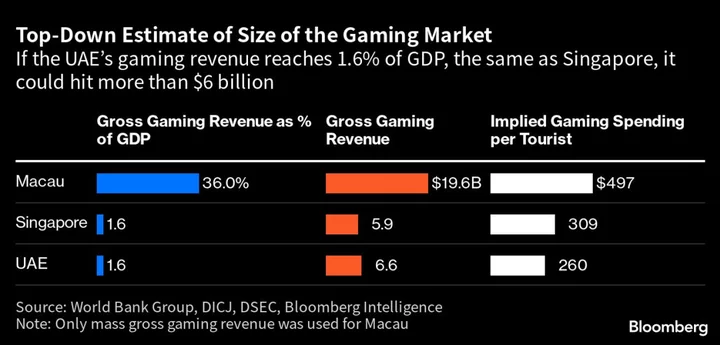The United Arab Emirates has established a federal body to regulate the gaming industry, paving the way for the country to potentially become the first Gulf state to legalize casinos.
The new authority is being set up to introduce a “world-leading regulatory framework” for a national lottery and commercial gaming, state media reported late on Sunday. The move comes about a month after Wynn Resorts Ltd., which is building a $3.9 billion gaming resort in the UAE, said it expects to “soon” obtain a license.
The regulator’s board will be chaired by Jim Murren, the former chief executive officer of MGM Resorts International, WAM said. Kevin Mullally, who has close to three decades of experience in the gaming industry, will be the chief executive officer of the new entity, which will coordinate regulatory activities and manage licensing nationally.
Earlier this year, senior government officials told Bloomberg there are no imminent plans to allow gambling, but casino operators, consultants and lawyers familiar with the matter say there have been early discussions and a change is being considered.
Read More: Casino World Bets on UAE as New Gambling Hub to Rival Singapore
The stakes are high. The UAE could pull in as much as $6.6 billion of gaming revenue annually and eventually surpass Singapore, home to the renowned Marina Bay Sands resort, according to Angela Hanlee, a senior gaming and hospitality analyst for Bloomberg Intelligence.
Allowing gambling would be a step change for the UAE where Islamic, or Shariah law, is the main basis for legislation. The practice is prohibited under Islam and is illegal in the country, where offenders can be fined or sentenced to two years in prison, or both.
The issue about whether to legalize casinos is just one of a number of changes potentially coming to a region that’s been easing rules around social behavior such as allowing non-married couples to live together.
Faced with increasing competition from neighbors such as Saudi Arabia and Qatar, Dubai, in particular, has introduced a series of reforms to keep its edge as the region’s top tourism and trade hub. In Saudi Arabia, it’s still an open question about whether it will allow alcohol in hotels.
Read More: The Emirate Pitching Itself as the Next Haven for Billionaires
In April, Wynn Resorts unveiled details of its planned resort off the coast of the UAE. The beach-front Wynn Al Marjan Island will be one of the world’s largest gaming facilities with 1,500 rooms and villas, and is being built in Ras Al Khaimah — an emirate about 45 minutes from Dubai.
Chinese tourists and loyal customers to Wynn will be key to filling rooms at its new gaming resort in the UAE, Raki Phillips, chief executive officer of the Ras Al Khaimah Tourism Development Authority, said in May.
Dubai would likely benefit the most from any push into gambling. The emirate has already seen an influx of newcomers and tourists largely stemming from its handling of the pandemic and attractiveness as a wealth haven. The introduction of casinos could further boost its tourism sector — a key pillar of the emirate’s economy — that’s been booming and escaped much of the geopolitical and economic uncertainty elsewhere in the world.
A number of well-known casino brands already operate or are expanding in the city. Caesars Entertainment Inc. opened its first non-gaming resort on the city’s Bluewaters Island in 2018. Kerzner International Ltd. has long operated an Atlantis resort on the city’s palm-shaped islands and recently opened a second hotel a short stroll away from the original resort where the top suite goes for $100,000 a night.
MGM Resorts International announced plans with local developer Wasl to put an MGM-operated hotel and entertainment district, as well as a Bellagio and Aria hotel on a project called The Island just off Jumeirah Beach.
(Adds detail throughout.)









